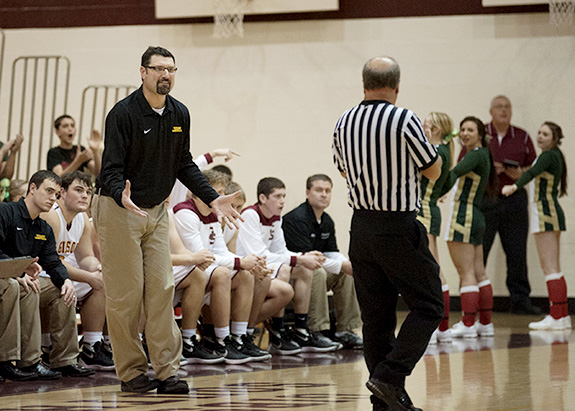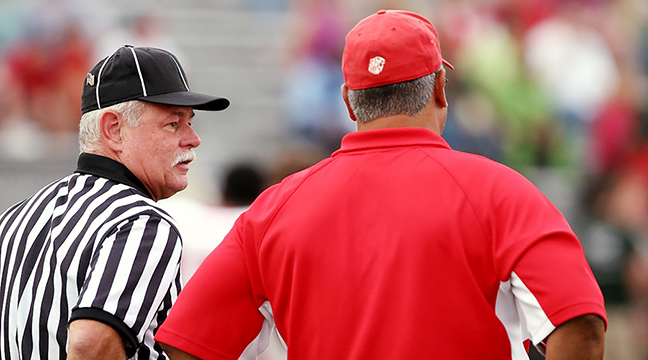Efforts to create better relationships between coaches and officials
Even casual observers, and most definitely athletic administrators, should be aware that there is a national shortage of officials. More referees and umpires are leaving the profession than new individuals are joining the ranks. The most commonly given reason is that officials have reached their limit of being harassed, and in some cases physically assaulted, by fans and coaches. Something has to be done to correct this situation, or playing games will definitely be altered or eliminated.
It may not be welcome news, but a change or transformation has to start and be led by athletic administrators. This process does begin with you, and it is your responsibility. As a matter of fact, if you don’t take this on, no one else will. The future is in your hands, and the perfect way to get started is to help your coaches adjust their mindset with respect to officials. Mindset? Yes, the way coaches view and interact with officials. Logically, this topic should be part of the agenda of every pre-season coaches’ meeting, and many athletic administrators typically hold one prior to each season. This would be the perfect setting to introduce a few truisms or maxims in order to establish a basic understanding.
 The following are a few truisms that should be shared and emphasized with your coaching staff:
The following are a few truisms that should be shared and emphasized with your coaching staff:
- Clearly point out that the coach–official relationship should not be adversarial. Officials are not the enemy, and viewing them as such starts the working relationship off on the wrong foot.
- Remind your coaches that officials are necessary in order to play a game. Other than sports like tennis and golf, which the participants call their own game, you need an official. The brutal fact is that without officials, you can’t play.
- Review the statistics and facts that officials are leaving in droves, and there may not be enough available individuals to fill and cover all contests. It has already happened in some sports and areas of the country in which games have to be rescheduled not due to weather, but due to the lack of officials.
- Point out that officials really don’t care which team wins a contest. They don’t show up having a favorite or preferred winner, and they only look to do the best that they can.
- Also explain that even though officials don’t have a preferred winner in a game, they are human and may not look forward to dealing with coaches who constantly ‘work the officials’ in order to gain an edge. Officials honestly don’t look to ‘even up’ calls. Their job is to call what they see to the best of their ability.
- Ask your coaches if their athletes have ever made a mistake in a game? Or better yet, even if some won’t admit to it, ask if coaches ever make a mistake. Why? Officials are human, and even though they try to do the best that they can, there may be an occasional missed or incorrect call.
- Explain that officials and coaches are not that different. Both love the game, want to be involved, have the desire to help young people, and give back to the sport. The only real difference is that coaches also want to win, and that is perfectly normal. But officials and coaches are involved for the same reasons.
Beyond these generalizations and maxims, it is also important that you share your expectations for your coaching staff with respect to their behavior and interactions with officials at their games. These points may lead to a better understanding and even an appreciation of officials, and they may be a starting point in developing a better, more positive working relationship. A least try sharing these truisms as a step in a proactive approach.
What next? When officials show up to referee a game, you as an athletic administrator, an assistant, or a student manager would normally greet, and show them to their locker room. In doing so, you would typically ask if there is anything that you can do to help, or do they need anything. But when the team comes onto the field or floor to warm up, there is also a little something that the coach can and should also do.
As the team begins to warm up, a coach should go over, extend a hand, and welcome an official. This doesn’t have to be an extended conversation, but a brief hello and welcome should be considered standard. While this pre-game effort may not totally eliminate the perceived adversarial relationship, it may be a little step forward.
 Since there are points of emphasis for officials in every sport prior to a new season, this brief time before the start of the contest is a good time for a coach to ask for clarification as to how the game might be called. With this interpretation, a wise coach can and should share this information with the players. It is always the players who have to see how the game is being called, and then make the appropriate adjustments as quickly as possible. A wise coach, who asks for an official’s perspective, can really help his or her players.
Since there are points of emphasis for officials in every sport prior to a new season, this brief time before the start of the contest is a good time for a coach to ask for clarification as to how the game might be called. With this interpretation, a wise coach can and should share this information with the players. It is always the players who have to see how the game is being called, and then make the appropriate adjustments as quickly as possible. A wise coach, who asks for an official’s perspective, can really help his or her players.
In addition, an athletic administrator should develop and communicate the standards regarding how coaches should behave on the sidelines and interact with officials. The following points or expectations for coaches should be included and covered.
- While a coach can ask for a clarification of a call in a contest, yelling at, and berating an official is unacceptable. Even a coach’s body language and gestures can incite his or her athletes and the fans, and this leads to the next expectation.
- A coach has to serve as a role model for the athletes and fans. Quite often the players and the crowd will watch a coach and how he or she interacts with the officials, and they follow suit. Therefore, to improve the deportment of the fans and the behavior of the athletes, a coach has to be a positive example.
- Asking politely for clarification of a call is fine, but ‘challenging’ a call isn’t. What’s the difference? Getting an explanation helps the coach understand and possibly helps the athletes adjust in the future. But a challenge is an attack upon the official, in which the coach may be questioning his or her integrity. This is never a good approach in order to foster and maintain a good working relationship.
- When a coach challenges an official’s intent, integrity, or ability, nothing good is going to result. The outcome will likely be a technical foul, a yellow or red card, or an ejection. Therefore, asking for clarification has to be done in a calm, and polite approach, and never done in an accusatory manner.
If one of your coaches crosses the line with officials and does not meet your expectations, it is time for a little one-on-one counseling. While this conversation may not be fun, it is absolutely necessary and one of your responsibilities. This meeting should occur the day following the incident, and the message has to be clear that the exhibited behavior was unacceptable and cannot be repeated.



